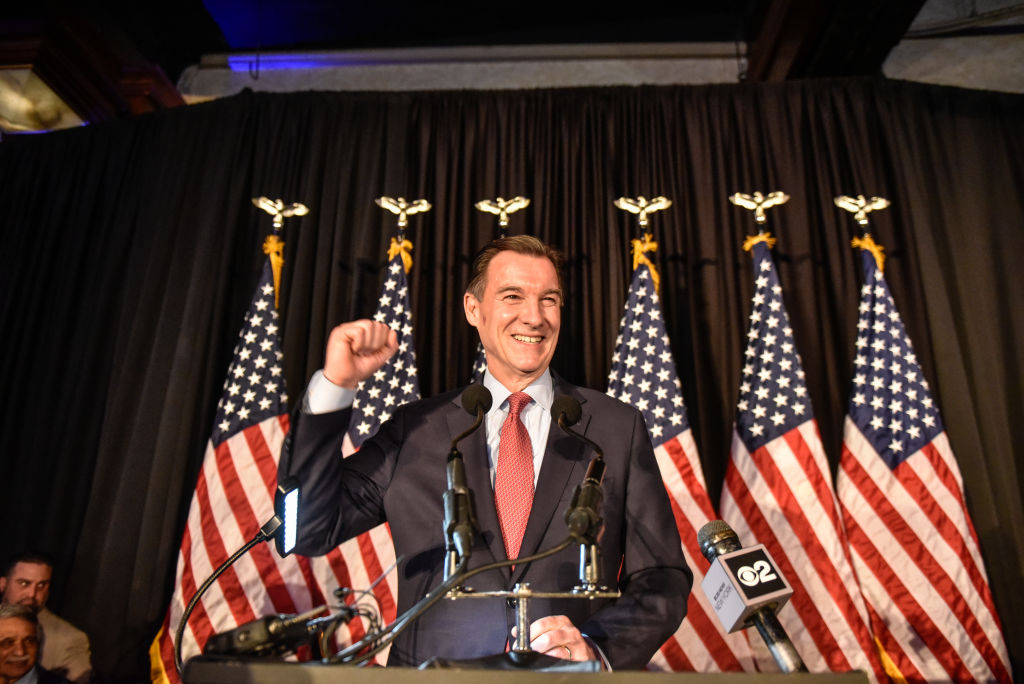Happy Wednesday! A programming note: We’ll be off Friday—and Monday is Washington’s Birthday (colloquially known as Presidents Day)—so look for the next Dispatch Politics in your inbox next Wednesday.
Up to Speed
- House Republicans impeached Homeland Security Secretary Alejandro Mayorkas Tuesday evening. The 214-213 vote was successful thanks to the return of Rep. Steve Scalise, the House GOP majority leader. The Louisiana Republican was undergoing treatment for cancer when the House initially attempted to impeach Mayorkas last week. Three Republicans voted against impeachment each time, including Rep. Mike Gallagher of Wisconsin (who recently announced his retirement at year’s end). Mayorkas is the first Cabinet secretary to be impeached in 150 years. But his trial in the Democrat-controlled Senate is headed for an acquittal; the basis for impeaching Mayorkas was not a personal workplace scandal but policy disputes over his management of the southern border.
- It looks like Ronna McDaniel’s planned exit from the Republican National Committee (RNC) is moving faster than she intended. Politico first reported Monday that former President Donald Trump’s choice to replace McDaniel as RNC head honcho is Michael Whatley, the RNC general counsel and North Carolina GOP chairman (Trump issued an official announcement about the endorsement later Monday). Additionally, Trump is pushing for his daughter-in-law, Lara Trump, to be RNC co-chair, and for his top campaign adviser, Chris LaCivita, to manage the committee day-to-day in a role the former president described as chief operating officer.
- The campaign arm for Senate Republicans has officially backed Kari Lake in the Arizona Senate race. Sen. Steve Daines of Montana, chairman of the National Republican Senatorial Committee, said in a statement that Lake is “one of the most talented candidates in the country.” The NRSC’s endorsement gives Lake a clear advantage in the GOP primary, where her only credible opponent so far is Pinal County Sheriff Mark Lamb. Lake is challenging Sen. Kyrsten Sinema, an independent who caucuses with Senate Democrats but left the party after her tack to the center rankled progressives.. Rep. Ruben Gallego is the leading Democratic candidate, meaning this high-profile Senate race in Arizona could see three competitive candidates—if Sinema runs for reelection.
- The Republican primary for U.S. Senate in Michigan is losing a contender. James Craig, the former police chief of Detroit, told the Detroit News he is dropping out of the race and considering running for mayor of Detroit instead. That leaves former Reps. Mike Rogers and Peter Meijer as the leading GOP contenders for the open seat held by retiring Democratic Sen. Debbie Stabenow. Former Rep. Justin Amash, who left the Republican party in 2019 and is currently a Libertarian, is exploring a Senate run and could run for the GOP nomination. Among the Democrats running to succeed Stabenow are Rep. Elissa Slotkin and actor Hill Harper.
A New York Victory Bolsters Democrats’ 2024 Outlook

Embattled President Joe Biden and nervous down-ballot Democrats received a huge morale boost Tuesday heading into the November general election. Their party’s nominee won a closely watched special election in a suburban New York City congressional district vacated in December when scandal-plagued Republican George Santos was expelled from the House of Representatives.
Democrat Tom Suozzi soundly defeated Republican Mazi Melesa Pilip in the 3rd Congressional District, 54 percent to 46 percent, with 93 percent of precincts reporting, per the Associated Press. Suozzi’s win, a return to Capitol Hill for the former congressman, gives Democrats an extra vote in the House while thinning even further the GOP’s threadbare majority. As Semafor’s David Weigel pointed out, Republicans will be down to 219 seats in a chamber in which 218 constitutes a majority. Democrats will control 213 seats after Suozzi is sworn in.
But Democrats were even more excited about what they hope Suozzi’s victory portends for the party in November against likely Republican presidential nominee Donald Trump. Biden would have won this district by 9 percentage points over Trump had it existed with its current boundaries in 2020. But the seat supported Republican gubernatorial nominee Lee Zeldin over incumbent Democratic Gov. Kathy Hochul two years later, boosting Santos to victory in what was then an open seat. Crime was a major issue in that race.
In Tuesday’s special election, border security—like crime, a voter concern favorable to the Republicans—emerged as the key issue on the heels of the recent migrant influx into New York City. Biden’s border policies have been blamed for the migrant crisis affecting Manhattan and other urban centers. It’s among the reasons the president was pushing Congress to approve bipartisan legislation to overhaul aspects of U.S. immigration law, and Republicans were hoping this debate would propel them to victory in the 3rd District.
Suozzi embraced the debate, acknowledging voters’ anxiety and supporting the border security compromise negotiated in the Senate and ultimately sunk by GOP opposition. (Pilip, an ethnic Ethiopian who served in the Israeli army, said she opposed the Senate border bill.) Democratic operatives are saying this contrast, and Suozzi’s approach, offers Biden and their party a model to follow this fall to overcome political headwinds fueled by this issue.
“Suozzi was helped by his support for the strongest border enforcement bill ever, and Pilip (like other Republicans) looked silly and hypocritical for opposing it,” Geoff Garin, a Democratic pollster, said in a post on X, formerly Twitter. “This is a good template for 2024: Democrats want to solve problems, Republicans only want to play politics instead.”
“Suozzi could’ve ignored immigration, dismissed voters’ concerns about migrants, tried to change the subject. But he didn’t. He actually *leaned in* on it,” Democratic strategist Lis Smith added, also on X.
Democrats, meanwhile, were also celebrating a special election win in suburban Philadelphia, where the party held onto a vacant seat in the Pennsylvania House of Representatives and solidified control of the legislature in this crucial swing state. The Biden campaign even issued a statement. “Donald Trump lost big tonight in an important county in a critical battleground state as his unpopular extreme MAGA agenda continues to be rejected by voters,” Biden campaign manager Julie Chavez Rodriguez said.
Caveats apply, of course.
Nonpartisan political analysts cautioned, accurately, that special elections aren’t necessarily predictive about what will happen in the general election to follow. But that fact has never stopped politicians and their advisers from treating them as harbingers. As such, underdog Republican presidential contender Nikki Haley used the results in the 3rd District to blame Trump for leading the GOP to yet another loss at the ballot box. “Let’s just say the quiet part out loud. Donald Trump continues to be a huge weight against Republican candidates,” Haley spokeswoman Olivia Perez-Cubas said in a statement.
Meanwhile, the former president used the outcome to blame the loss on Pilip’s insufficient backing of him and “MAGA.” Trump described her as a “very foolish woman” who would have “easily won” had she embraced him and his political movement.
The GOP’s Most Consequential Acquittal
Tuesday was the third anniversary of the Senate vote on convicting Donald Trump following his second impeachment. Our colleague John McCormack pinpoints that moment as “the closest the former president ever actually came to being denied the 2024 GOP nomination” in a well-reported piece for the website. Here’s an excerpt:
Did Senate Republicans realize during Trump’s second impeachment trial that Trump would likely be the 2024 nominee if he wasn’t convicted and disqualified? “That’s a great question,” GOP Sen. Kevin Cramer of North Dakota, who voted against conviction, told The Dispatch in the Capitol last week. “I don’t think I did, because I couldn’t imagine why anybody would want to do this again after what he had gone through. That was a miscalculation of Donald Trump’s drive, obviously, for sure.”
Cramer said he thought the Senate lacked the constitutional authority to convict a former president, and also believed the article of impeachment—which focused on “incitement of insurrection”—was weak because those who rioted bore responsibility. Did he think there was a stronger argument that Trump was guilty of dereliction of duty? “Everybody from Don Jr. to Lindsey Graham [and] his family were reaching out saying ‘Do something, do something, say something. Get out there,’” Cramer recalled. “I think that was probably the biggest disappointment a lot of people had, was that while he wasn’t responsible for the event happening that he maybe could have persuaded people to stop sooner. But again, that responsibility still rests with the perpetrators themselves ultimately.”
GOP Sen. Lisa Murkowski of Alaska, one of the seven Republicans who did vote to convict Trump three years ago, told The Dispatch she “surely thought” at the time that a former president who had lost his re-election bid and been impeached twice “would kind of fade from the political headlines.” She wouldn’t say, however, if she believed her colleagues that voted against conviction were influenced by that same miscalculation. “I don’t know if it’s fair for me to ascribe what others were thinking,” Murkowski replied. Two other Republicans who voted to convict Trump in 2021 similarly declined to comment on the motives of GOP senators who voted to acquit. “I can’t opine on the perspectives of my colleagues,” Sen. Mitt Romney of Utah told The Dispatch. Sen. Bill Cassidy of Louisiana said: “I can only speak for myself.”
Still, Murkowski wonders if the trial’s outcome would have been different if it had been held immediately after January 6, rather than kicking off on January 26. “As with everything that seems to go on around here, with the passage of time, you start hearing kind of a different set of facts, if you will, or a softening of the actual events,” she said, pointing to “those on the outside who just say, ‘Well, that wasn’t that bad.’ You know, ‘I saw that quick video, and it wasn’t that bad.’”
“I was here,” Murkowski said. “I’m not going to reshape my facts.”
Read the whole thing here.
Notable & Quotable
“Can you imagine? A former president of the United States saying that? The whole world heard it. And the worst thing is he means it. No other president in our history has ever bowed down to a Russian dictator. Let me say this as clearly as I can — I never will. For God’s sake, it’s dumb, it’s shameful, it’s dangerous, it’s un-American.”
—President Joe Biden, responding to Donald Trump’s claim he would tell Russia to “do whatever the hell they want” to NATO allies that don’t increase their defense spending, February 13, 2024







Please note that we at The Dispatch hold ourselves, our work, and our commenters to a higher standard than other places on the internet. We welcome comments that foster genuine debate or discussion—including comments critical of us or our work—but responses that include ad hominem attacks on fellow Dispatch members or are intended to stoke fear and anger may be moderated.
With your membership, you only have the ability to comment on The Morning Dispatch articles. Consider upgrading to join the conversation everywhere.